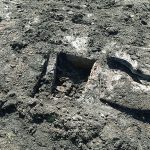

Burial cist discovered in Finstown

A 3,500-year-old burial cist has been uncovered during exploratory archaeological excavations at the site of a proposed SSEN substation.
The cist in Finstown was found intact just below the ground surface, and consists of a stone-lined box capped with a large flat stone.
It would have likely contained the remains of an individual who lived during the Bronze Age.
The burial was discovered by a team from the Orkney Research Centre for Archaeology (ORCA) who are undertaking environmental survey works ahead of construction, should the substation be approved.
Local soil conditions aren’t great for the preservation of bone, and at first sight the cist appears empty, but careful excavation may reveal some traces, says ORCA.
Pete Higgins, senior project manager, said: “Previous survey work told us there was significant archaeology present at the site and we are pleased that within the first few days we have our first major find.
“It is fascinating to think that we are the first people in 3,500 years to look into this structure. We are working with SSEN Transmission to record the archaeology of the site, and this is a great start.”
The proposed substation, which would connect Orkney to the main transmission grid for the first time, has attracted criticism from the Orkney Heritage Society, as they seek planning permission to go ahead with the project.
SSEN Transmission’s environmental project manager, Simon Hall, continues: “As a responsible network operator, we take our environmental standards very seriously and strive to do everything we can to ensure that our proposed works minimise disruption and impact to our host communities, whilst meeting our license obligations.
“For this particular project, that includes working with local archaeological experts ORCA Archaeology as part of our pre-construction assessments to fully understand the archaeological features and history at the Finstown site.
“We are delighted that it has resulted in the discovery of such an exciting feature, that otherwise may never have been found. We look forward to continuing to work closely with ORCA as the excavation progresses.”